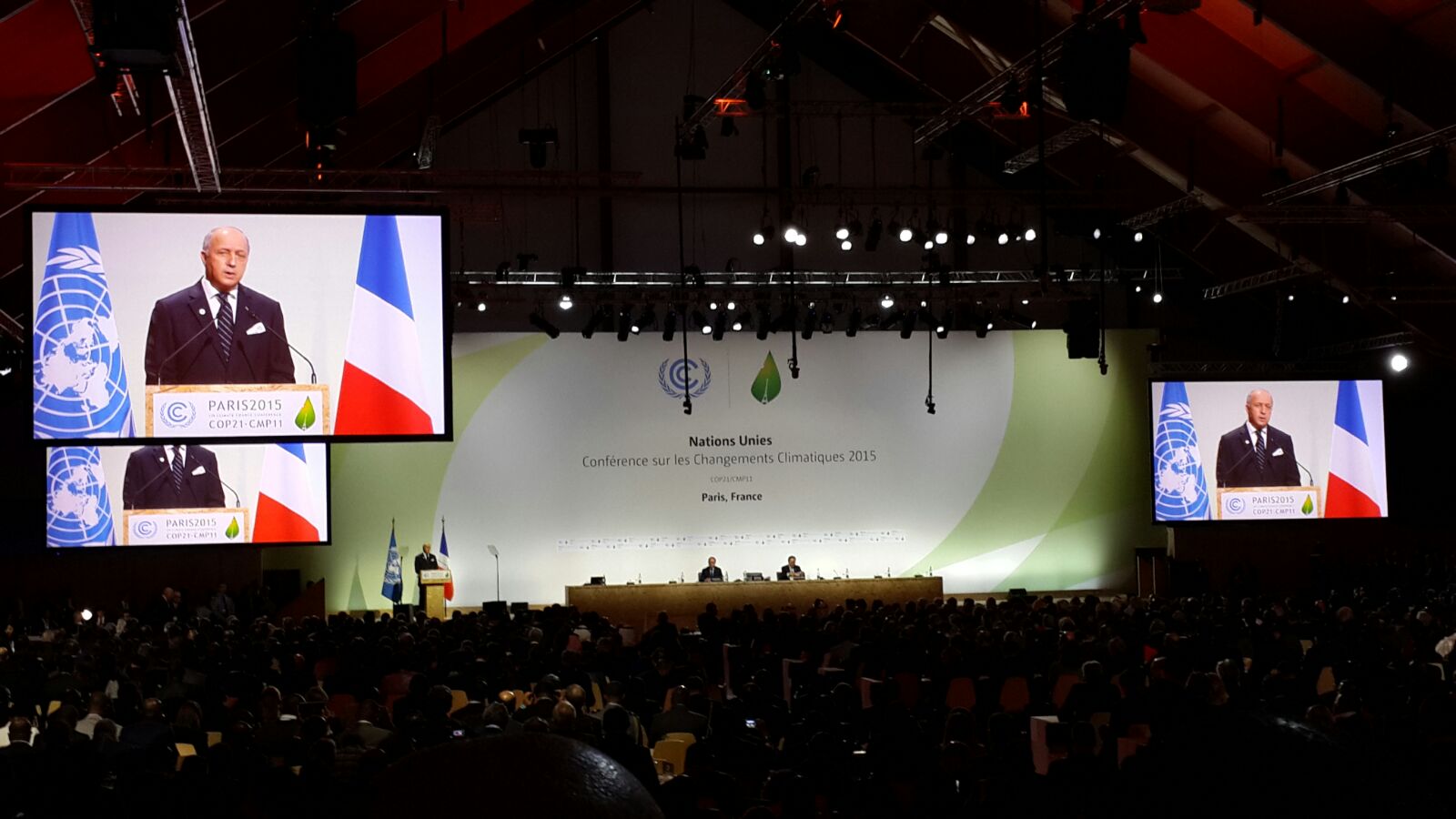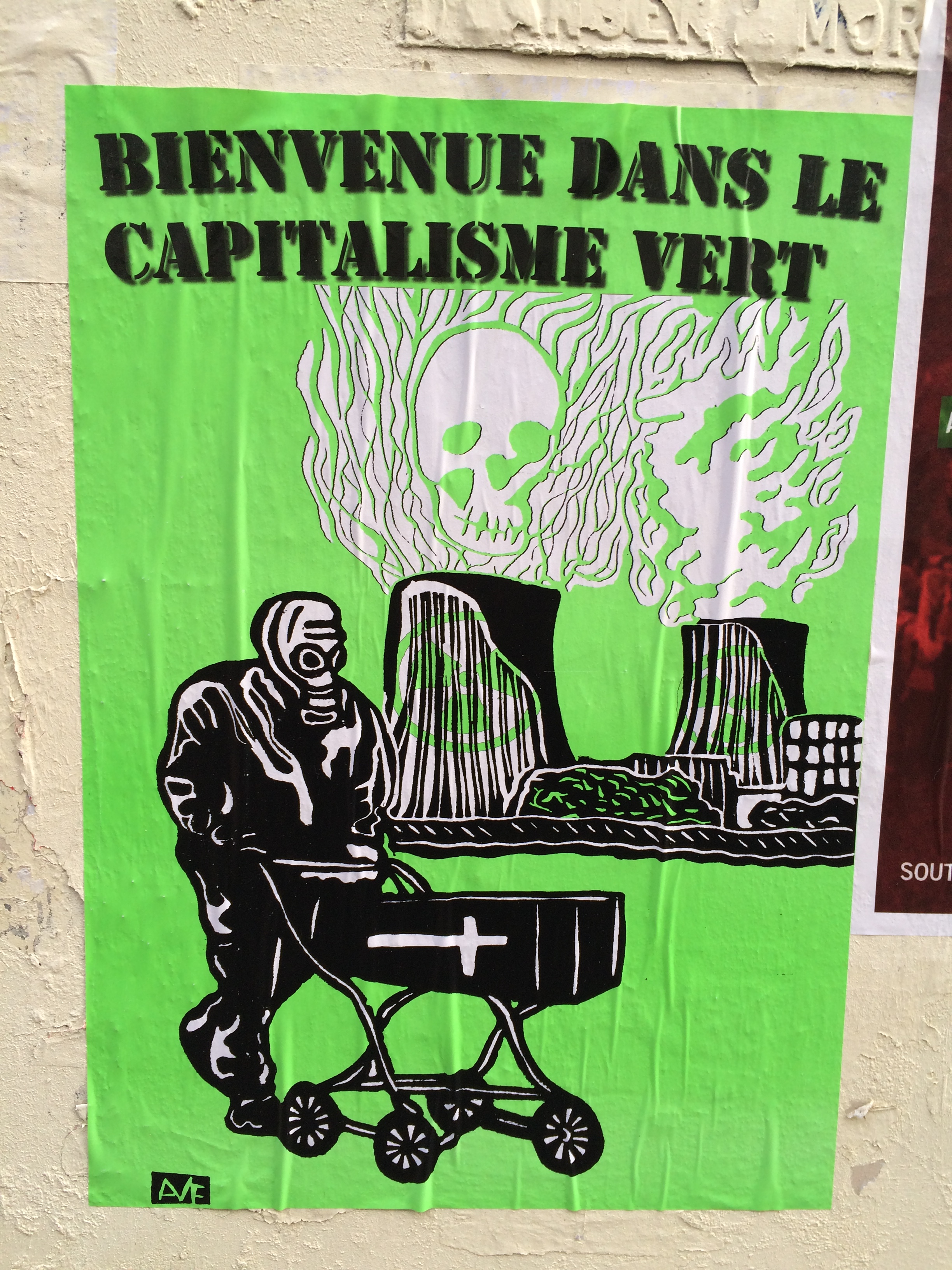by Ethemcan Turhan*
It is high time that political ecology problematizes the corporate show from the inside out and reclaims its well-deserved status in these meetings.
It is an interesting feeling to be at a multilateral environmental conference that gathers 20.000 accredited participants, 6.000 police for security checks, 3.000 journalists and is told to be about “saving/negotiating the future of the planet”. This specific one I’m in is called 21st Conference of the Parties to the United Nations Framework Convention on Climate Change (UNFCCC) or in its more popular shorthand, COP21. In this dispatch, I reflect on what it may mean to be a political ecologist inside the prefabricated hallways of the gigantic international mega-conference.
First, let me give you an idea about the basics of this conference full of weary eyes and long coffee queues. COP21, as the name suggests, is the 21st meeting of parties (now standing at 195 to be precise) to the UNFCCC. The past 20 meetings have all but produced rising greenhouse gas emissions with ever more serious consequences. This also led to questioning the success of the multilateral process and whether or not this is the correct venue to achieve the required ambition. Nonetheless, UNFCCC continues to be the most important venue for multilateral action, where pretty much all the countries are represented.

The COP21 meeting. Photo credit: Ethemcan Turhan
A climate summit of this size is quite hard to navigate unless one has a clear idea of what to follow. While you have negotiators from the countries going line by line over a draft treaty text (that counts 43 pages as of today) on one hand, you also have representatives of indigenous communities in their traditional outfit talking about peatland conservation on the other.
On one side you have the powerful negotiating bloc of developing countries, G77+China, holding a press conference about the right to development, on the other side you have a meeting of the nuclear lobbyists benefiting from the statements of climate celebrities like James Hansen.
Somewhere in the midst of all this, you have carefully crafted, previously informed and non-confrontational ‘actions’ by the civil society.
Of course, the real impact of COP21 is not limited to the walls of these highly-securitized large halls located in a military airport, Le Bourget. There is a whole world of climate change debate ongoing beyond what is called the ‘Blue Zone’. Probably one of the most impressive of this type of engagement is the self-organized radical spaces and convergence zones for action.
For a fresh kick-off, last Friday climate justice activists denounced and disrupted the corporate-run ‘Solutions COP21’ event preaching techno-fixes such as CCS (carbon capture & storage), carbon markets and geoengineering. These groups calling for a radical realism on climate politics have also organized a People’s Summit on Climate Change over the course of last weekend in Montreuil, which hosted a series of concerts, public events, book talks and a NGO fair.
The highlight of this event was probably the convergence of multiple social justice struggles, linking issues from energy democracy to sans-papier migrant rights, from degrowth to feminist movements, from peasant rights to anti-tax evasion movements. The People’s Summit also hosted a mock trial called ‘Exxon vs. The People’ organized by Naomi Klein, the bestselling author of ‘This Changes Everything’ and 350.org’s Bill McKibben.
At this event, which featured testimonies of frontline communities who face the overlapping impacts of the extractivism and climate change, Klein rightly noted that “indeed there is hardly anything mocking, funny about such trials.” Considering the non-binding INDC’s (intended nationally determined contributions) of 186 parties submitted ahead of COP21, which promise a planet with somewhere between 2.2-3.4 degrees of warming, she seems coolheaded on that.

“Welcome to green capitalism”. Photo credit: Ethemcan Turhan
The second week at COP21 is starting today and it already promises to be a tough week with ministerial-level bargaining on all fronts. Loss & damage, long term decarbonization goals, climate finance and fair atmospheric shares are only some of the issues that are still pending to be solved to reach a fair, binding and enforceable international treaty by the end of the week. And if there is one thing that everyone agrees, it is the fact that COP21 will “at least be a step forward” as I often hear in the meetings here.
Yet one cannot really tell in which direction we are heading forward without problematizing and politicizing the ambiguous and universalist politics of ‘we are all in the same boat’ talk. Despite the ban on public protests under a heavy-handed police presence due to state of emergency in Paris, climate justice groups and delegations from the most vulnerable countries are likely to push the limits further on this in the coming days.
All in all, it would not be far-fetched for me to say that COP21 is somewhere between a rugged diplomatic spectacle and a super-sized political jamboree. However, it is precisely due to this fact that such mega-conferences should not be left to their fate or rendered irrelevant/ineffective/inefficient straight away.
Political ecologists who have increasingly problematized the first world political ecologies, can and should take the lead not only in critically analyzing the outcome but also the processes, procedures and off-shoots of a meeting of this sort. A clear example of this sort of engagement is a thick-description of the global climate justice movement and its contribution to the most vulnerable communities around the world. This is not to suggest a focus on COP as a savior of any sort, quite the contrary indeed. It is high time that political ecology problematizes the corporate show from the inside out and reclaims its well-deserved status in these meetings.
*Ethemcan Turhan is a Mercator-IPC fellow at Istanbul Policy Center, Sabancı University (Turkey).






3 Comments